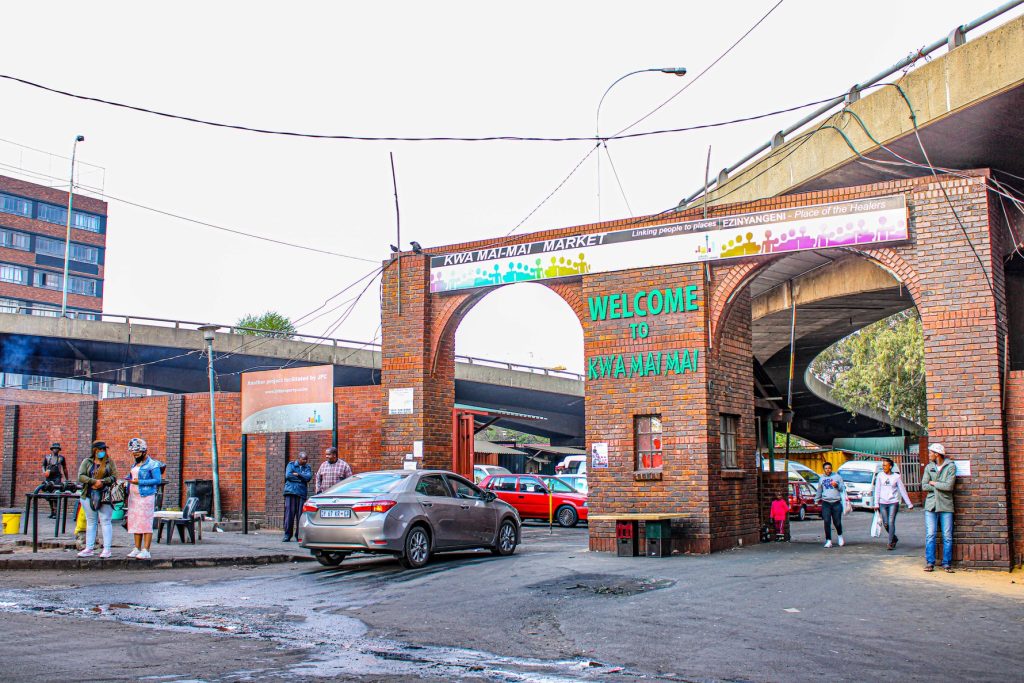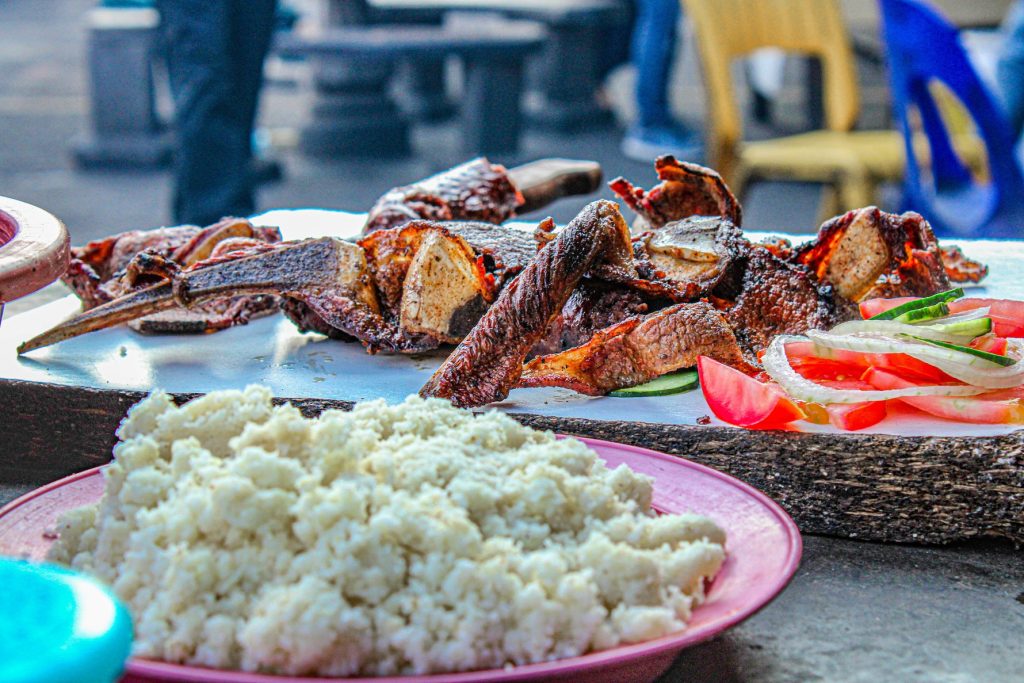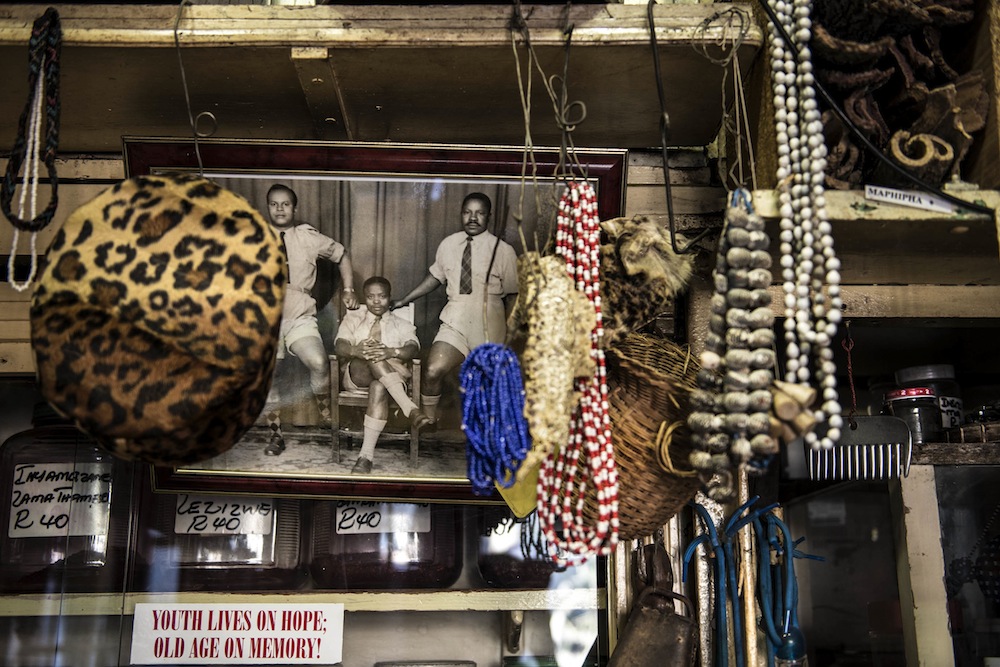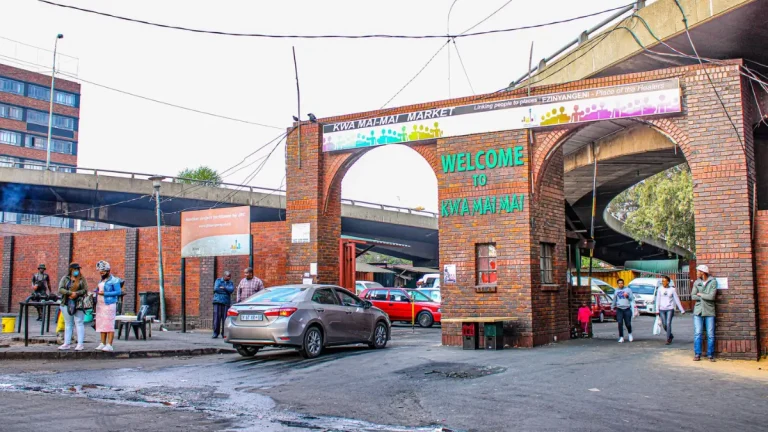Along the eastern edge of the Maboneng Precinct, just off Anderson and Berea streets, lies Kwa Mai Mai, one of Johannesburg’s oldest and most captivating markets. It is a place where tradition and modern life share the same rhythm. Sangomas, leather traders, and food vendors work side by side, shaping a space that feels alive with energy, smoke, and song.
Thank you for reading this post, don't forget to subscribe!Kwa Mai Mai, pronounced “My-My,” has long been a cornerstone of inner-city culture. It remains one of the few places where you can feel the pulse of Johannesburg’s working-class heritage. While Maboneng attracts a hip, curated crowd, Mai Mai stays true to its roots, a place built by the people, for the people.
A Market with Deep Roots
Kwa Mai Mai began in the 1920s when migrant workers from across southern Africa settled near the old city hostels. They brought their crafts, languages, and traditions, creating a space that became part home, part marketplace. Over time, it grew into a center for traditional medicine, handmade goods, and open-fire cooking.
The stalls sell herbs, roots, and remedies steeped in generations of knowledge. Healers still use the market as a space for consultation, sharing wisdom about plants, protection rituals, and community wellbeing. Every shelf and bundle tells a story of connection and survival
Kwa Mai Mai continues to serve as one of South Africa’s most respected centers for traditional healing. Visitors move between rows of muthi sellers, the air rich with the scent of imphepho and herbs. This is where spiritual and physical healing intertwine with everyday life.

A Feast for the Senses
Step into Kwa Mai Mai, and the city changes pace. You hear the steady beat of drums and chatter, smell the smoke from nearby braais, and feel the energy of a place that refuses to fade. Leatherworkers hammer shoes into shape while cooks turn sizzling meat over coals. The narrow passages hum with sound and life.
The shisa nyama section is the soul of the market. Fresh meat hits the flames, sending waves of smoke through the air. Ribs, liver, and boerewors sizzle as pap and chakalaka wait to be dished up. The food arrives on brown paper or enamel plates, eaten with your hands and shared among friends sitting on crates under tin awnings.
Eating at Kwa Mai Mai is not just about filling up. It’s a social moment — an unspoken agreement that food tastes better in company. Regulars say you can feel Johannesburg’s heart here more than anywhere else. It’s warm, loud, and honest, a reflection of the city itself.
The Beating Heart of the Inner City
Kwa Mai Mai has survived everything the city has thrown at it. As downtown Johannesburg changed, the market stood firm. New buildings rose around it, but this space stayed rooted in history.
On weekends, the market becomes a living stage. Men play dominoes in small circles. Women weave baskets under the shade. Elders swap stories while children chase each other between stalls. The soundscape shifts constantly: maskandi guitar riffs fade into amapiano and gospel. Every corner hums with movement.
Unlike other urban markets that cater to tourists, Kwa Mai Mai is raw and real. It hasn’t been repackaged for cameras or curated for social media. What you see is what you get — authentic Johannesburg, unfiltered and proud.
A Hidden Culinary Treasure
Gauteng’s food scene is filled with trendy restaurants and high-end dining, but Kwa Mai Mai offers what those places can’t: authenticity. The market’s shisa nyama stalls serve meat seasoned with homemade spice blends and cooked by hand. The cooks know their customers by face and serve with genuine warmth.
Favorites include grilled chicken feet with pap, tender beef ribs, and boerewors rolls with a side of chakalaka. The stalls like Sbu’s Grill, The Meat Yard, and Mama D’s Kitchen have become local legends. Their secret lies not in presentation but in consistency. The prices are fair, the portions generous, and the atmosphere always inviting.

Here, the act of eating connects people. Strangers become tablemates. A shared meal becomes a story worth retelling. Kwa Mai Mai captures that unique Gauteng energy, the mix of hustle, humor, and heart that keeps Johannesburg moving.
Preserving a Piece of Johannesburg’s Soul
Kwa Mai Mai is more than a market. It’s a living record of Johannesburg’s migrant labor history and township entrepreneurship. The traders, healers, and artisans who operate here rely on it for their livelihoods. Every purchase supports a network of families who keep traditional practices alive.

Yet, this space faces pressure from urban redevelopment. Plans to modernize or relocate Kwa Mai Mai resurface every few years, sparking resistance from the people who depend on it. For them, this is not just a workplace. It is sacred ground, a place that holds the memory of generations.
Supporting Kwa Mai Mai means standing for something larger than commerce. It means recognizing the value of spaces that hold culture together and choosing to protect what cannot be rebuilt once it’s lost.
If You Visit
Where: Corner of Anderson and Berea Streets, Johannesburg CBD
When: Open daily from early morning to late afternoon; weekends are busiest
What to eat: Grilled liver and pap, chicken feet, boerewors rolls, and traditional beer (umqombothi)
What to explore: The muthi stalls, leather workshops, and the healers’ courtyard
Tip: Bring cash, dress comfortably, and engage respectfully. Always ask before taking photographs.
Why Kwa Mai Mai Still Matters
In a city that changes faster than most can keep up, Kwa Mai Mai remains constant. It connects modern Johannesburg to its roots, linking the stories of past generations with the rhythm of today. It shows that urban life doesn’t have to erase tradition — it can coexist with it.
Visiting Kwa Mai Mai is not about sightseeing. It’s about understanding the living heartbeat of Johannesburg. You come here to listen, to taste, to connect. You leave with smoke in your clothes, stories in your head, and a new appreciation for the city’s resilience.
The Takeaway: Support Local, Honor Heritage, Keep It Real
Kwa Mai Mai represents everything Johannesburg stands for: grit, creativity, survival, and soul. Every purchase and every meal helps sustain a community that has served the city for nearly a century.
So, skip the polished eateries this weekend. Take a walk downtown, follow the smoke, and spend a few hours where Joburg still feels most alive. You’ll find food that tells a story, people who welcome you like family, and a reminder that the city’s heart still beats strongest where the fire never dies.




